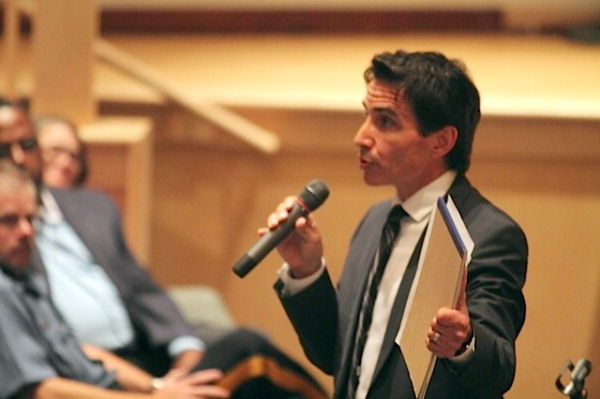By Philip Sean Curran, Staff Writer
In October 2014, representatives of the school district including Superintendent of Schools Stephen C. Cochrane had a high-level meeting with the leadership of the Institute for Advanced Study to talk dollars and cents.
The district was looking for “some financial support” for educating the children of IAS visiting members who live temporarily in town and were eligible for a free education, said a source familiar with the meeting. The short-term apartments where the visiting IAS members reside are tax-exempt, so the IAS does not pay local taxes on them, according to the municipal tax assessor’s office.
According to sources, the IAS cited financial constraints for saying no to the district for providing funding of students’ education but left open potentially providing grants for initiatives in the schools. The refusal came as IAS was in the midst of raising $212 million during a fundraising campaign that ended last year.
“They do want to partner with us, in educational ways,” Mr. Cohcrane said last week during a workshop for the upcoming school budget. “We share a common mission in that respect. But at this point, there was no money coming our way.”
For the school district, it was a fleeting attempt to reach an arrangement similar to the one the municipality has with the major educational nonprofits in Princeton. For instance, the town and Princeton University reached a seven-year deal in 2014 for Nassau Hall to give $21.7 million to the municipality over the life of the agreement as part of what both sides call a voluntary financial contribution.
Last year, the town received $2.8 million from Nassau Hall, $250,000 from the IAS, $193,010 from the Princeton Theological Seminary, and $500,000 from a facility run by the Christian Scientists called Tenacre for $500,000 — all in the form of voluntary contributions or payments in lieu of taxes.
But not one cent of that amount gets shared with the school district, or Mercer County for that matter, as the money goes straight into the municipal coffers to help balance the town budget each year. When asked about the possibility of sharing some of that money with the school board, municipal officials this week mostly resisted the idea.
“It’s a legitimate question; it’s never been done that way,” Councilwoman Jo S. Butler said Monday. “If Steve Cochrane wants to approach us, he’s welcome to approach us.”
Other municipal officials, including Mayor Liz Lempert, said they feel the board would be best served trying to negotiate with the educational institutions themselves. She said Wednesday that she was not sure the town could even legally share money with the district.
“I don’t know if we can write checks to other governments or other institutions without getting something back,” she said. “It would certainly be a better process if that were part of the upfront negotiations.”
School board President Andrea Spalla said Monday that the board has never had talks with the council about the municipality sharing the money that it gets from the nonprofits. Nor has the board discussed trying to negotiate a voluntary contribution with Princeton University, for example, the way the town has.
“Maybe the time is ripe,” she said by phone. “Our budget constraints are real.”
With school taxes due to go up, Ms. Spalla and the rest of the board find themselves with limited avenues to raise money from “alternate” sources.
Based on preliminary 2016-17 budget figures released last week, the school portion of residents’ tax bill is due to go up by $215.12, based on the average home assessment of $810,191. The public will get a look at the preliminary school budget next week at the school board meeting Tuesday.
District officials feel the public schools add value to the community and help make the town attractive when faculty or others affiliated with the educational institutions decide to move here.
“The Institute for Advanced Study and its community of scholars greatly value the excellent Princeton public schools,” IAS spokeswoman Christine Ferrara said. “Our visiting scholars, who come from all over the world, make their home in Princeton each year and benefit from the district’s stimulating and academically rich environment. We hope that Princeton feels similarly enriched by this international presence.”
“Institute Director Robbert Dijkgraaf has met with Princeton Schools Superintendent Steve Cochrane on a few occasions to discuss possible partnerships and collaborations related to science research and similar initiatives,” she continued. “The institute has supported the Princeton school district in the past, and we are invested in building and deepening our relationship as an active member of the community.”
As for the IAS, Mr. Cochrane is looking to build relationships.
“The institute has given grant monies in the past to the district,” he said. “More recently they have expressed interest in supporting our future work in key areas such as science research and the possible development of an International Baccalaureate Program.”

